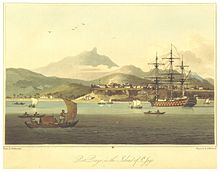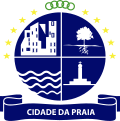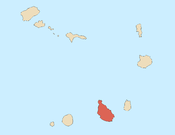Praia Harbour
The bay of Praia lies between the headlands Ponta Temerosa and Ponta das Bicudas. The islet Ilhéu de Santa Maria lies in the bay, west of the port. The river Ribeira da Trindade empties into the bay, between the city centre (Plateau) and the port. Directly north of the port is the city subdivision Achada Grande Frente.
History




The first mention of the Praia harbour dates from 1497, when explorer Vasco da Gama anchored there on his way to India. There was a settlement at the bay already in 1515. In the 16th century the port developed into an important port of call for ships towards São Tomé and Brazil, in rivalry with the nearby older port city Ribeira Grande (now Cidade Velha). Between the end of the 16th century and the end of the 18th century, both Ribeira Grande and Praia suffered many pirate attacks, including those by Francis Drake (1585) and Jacques Cassard (1712). The harbour was mentioned as "P. Praya" in the 1747 map by Jacques-Nicolas Bellin. Praia gradually superseded Cidade Velha to become the most important port of Cape Verde, and became the capital of Cape Verde in 1770.
The naval battle of Porto Praya, part of the Anglo-French War of 1778-83, took place on April 16, 1781 inside the harbor. The port of Praia was the first stop of Charles Darwin's voyage with HMS Beagle in 1832. The old quay of São Januário was located at Praia Negra, directly under the Plateau (Praia). A new wooden pier was built in 1880 near the customs house, which is now the National Archives of Cape Verde Building, south of the Plateau. This pier was replaced with a concrete pier in the late 1920s. In 1881 the Farol de D. Maria Pia was built at the harbor entrance.
In the beginning of the 1960s new port facilities were constructed on the east side of the bay, 1 km southeast of the city centre. In the following years it was expanded and modernized, most recently in 2014.
Ferry services
There are ferry connections from Praia Harbor to the islands of Brava, Fogo, São Nicolau, São Vicente, Maio, Boa Vista and Sal.
See also
References
- ^ "UNLOCODE (CV) - CAPE VERDE". service.unece.org. Retrieved 22 April 2020.
- ^ Statistics Port Praia, ENAPOR, December 2017
- ^ "Port of Praia" (in Portuguese). ENAPOR. Archived from the original on 19 February 2017. Retrieved 30 August 2018.
- ^ Valor simbólico do centro histórico da Praia, Lourenço Conceição Gomes, Universidade Portucalense, 2008
- ^ Jacques-Nicolas Bellin (1747). "Carte des Isles du Cap Verd = Kaart van de Eilanden van Kabo Verde" (in French).
- ^ Centre historique de Praia, UNESCO
- ^ Theal, George McCall (1897) History of South Africa under the administration of the Dutch East India Company, 1652 to 1795. (S. Sonnenschein & co., Ptd.). p.181.
- ^ Journal of researches into the natural history and geology of the countries visited during the voyage of H.M.S. Beagle round the world - Chapter 1 at Wikisource
- ^ Cabo Verde Fast Ferry's website
Bibliography
External links
- Presentation Port Praia, ENAPOR
- Statistics Port Praia, ENAPOR


